

By Anthony Mugo
As the global community marked World Hypertension Day on 17th May 2025, the national spotlight has turned to the unfolding public health crisis of rising incidence of Non-Communicable Diseases (NCDs) in Kenya, particularly hypertension. According to the World Health Organisation (WHO), NCDs, also referred to as chronic diseases, are ailments that are not transmitted directly from one person to another. Although they are still not the leading cause of disease and death in Kenya, these conditions are contributing significantly to the increasing economic and human resource loss burden, thereby undermining the country’s social and economic development.
Responsible for 39 per cent of deaths in Kenya, NCDs have become one of the biggest public health concerns. According to the MoH, 30 percent of Kenyans have hypertension, and the majority are not aware, hence why it is referred to as the silent killer. If not well controlled, hypertension leads to the most common life-threatening diseases of the heart and blood vessels, collectively known as cardiovascular diseases (CVDs), as well as kidney damage. Other NCDs include diabetes, cancers, chronic respiratory diseases, and mental health conditions.
Fortunately, the first line of defence against NCDs is simple and affordable. It involves encouraging people to know their five key numbers, namely: blood pressure, blood sugar, waist circumference, Body Mass Index (BMI), and blood cholesterol. Working in partnership with like-minded stakeholders, the MoH has rolled out a series of activities aimed at raising awareness and educating Kenyans about prevention measures against NCDs, seeking to combat them and reverse their rising prevalence.
The entire month of May has been branded the “May Measurement Month,” underscoring the need for people to know these crucial numbers and take charge of their health and wellness. Additional focus is on policy implementors to reorient Kenya’s health system to invest more in prevention at the primary health level, which will ensure that NCDs are detected early when it is cheaper and easier to control them. This is in line with the national aspiration to universal health coverage, which is based on principles of equity, people-centredness, efficiency, social solidarity, and a multi-sectoral approach.
“As a government, we are trying to ensure that screening services are much more accessible to citizens. We have equipped 107,000 Community Health Promoters (CHPs) with blood pressure measuring machines and blood glucose monitoring devices,” says Dr. Gladwell Gathecha, Head of the Division of Cancer and Non-Communicable Diseases at the Ministry. “We expect them to move from door to door in every household to ensure that Kenyans know these critical numbers and take action to keep them in check.”
She was speaking during a wellness screening camp set up by the Ministry on 14th May 2025, targeting all staff at its Afya House Headquarters. The initiative was held by the MoH in partnership with Doctors for Healthy Living (D4HL). D4HL is a not-for-profit social enterprise founded by a multidisciplinary team of professionals in medicine, public health, and health communication. It seeks to advance preventive healthcare in Kenya by promoting healthy lifestyle practices and supporting early diagnosis of NCDs through evidence-based behaviour change communication. The organisation’s main regular activity is a public wellness campaign dubbed Know Your Numbers.
The Patron is a veteran, long-serving physician and chest specialist, Dr. Joseph Oluoch. Talking about the need for people to know their numbers, Dr. Aluoch observed: “The adage that ‘prevention is better than cure’ is particularly relevant when it comes to NCDs. In many developing countries, including Kenya, doctors have tended to focus too much on curing diseases at the expense of prevention. The increasing incidence of NCDs tells us that this must change. We must educate communities about the value of prevention by knowing their numbers, which equips them to take charge of their health.”
Leading interventional cardiologist, Dr. Robert Mathenge, who is also one of the founders of D4HL, is emphatic about the need for people to know their numbers. “We realised that doctors go to college and specialise to treat complications of NCDs such as heart attacks, strokes and kidney failure,” he said. “Most people are not aware of the value of knowing these crucial numbers, yet by doing so and keeping them within the normal range, they would avoid complications of heart disease, stroke, and diabetes and live long, healthy lives.”
He went on to explain that D4HL started its Know Your Numbers Campaign to empower people with health information, hence equipping them to take charge of their well-being. According to him, people are wired to live for at least 100 years of high-quality life. He acknowledged that the duty of raising awareness and educating Kenyans to know their numbers is not the responsibility of the government alone, hence why D4HL encourages a range of partners to play their part.
Partnerships are at the core of any successful public mobilisation campaign. This is why we at D4HL appreciate the Ministry’s leadership. We call upon private health providers and companies in the health care ecosystem to join us and help us to achieve our target of ensuring that at least 50 percent of the population know their numbers.”
The wellness camp saw more than 150 MoH staff know their numbers. Notably, it provided the relatively new rapid test for cholesterol, something that most of the MoH staff, who included doctors, highly appreciated. Among the private sector partners who supported the initiative were Crown Health Care, Highridge Pharmaceuticals Ltd, Pathcare Kenya Ltd., Zambezi Hospital, and Medi World Systems Ltd.
Anthony Mugo is a Communication and Development Consultant. He is the Programmes and Partnerships Manager at Doctors for Healthy Living: info@doctors4healthyliving.org,
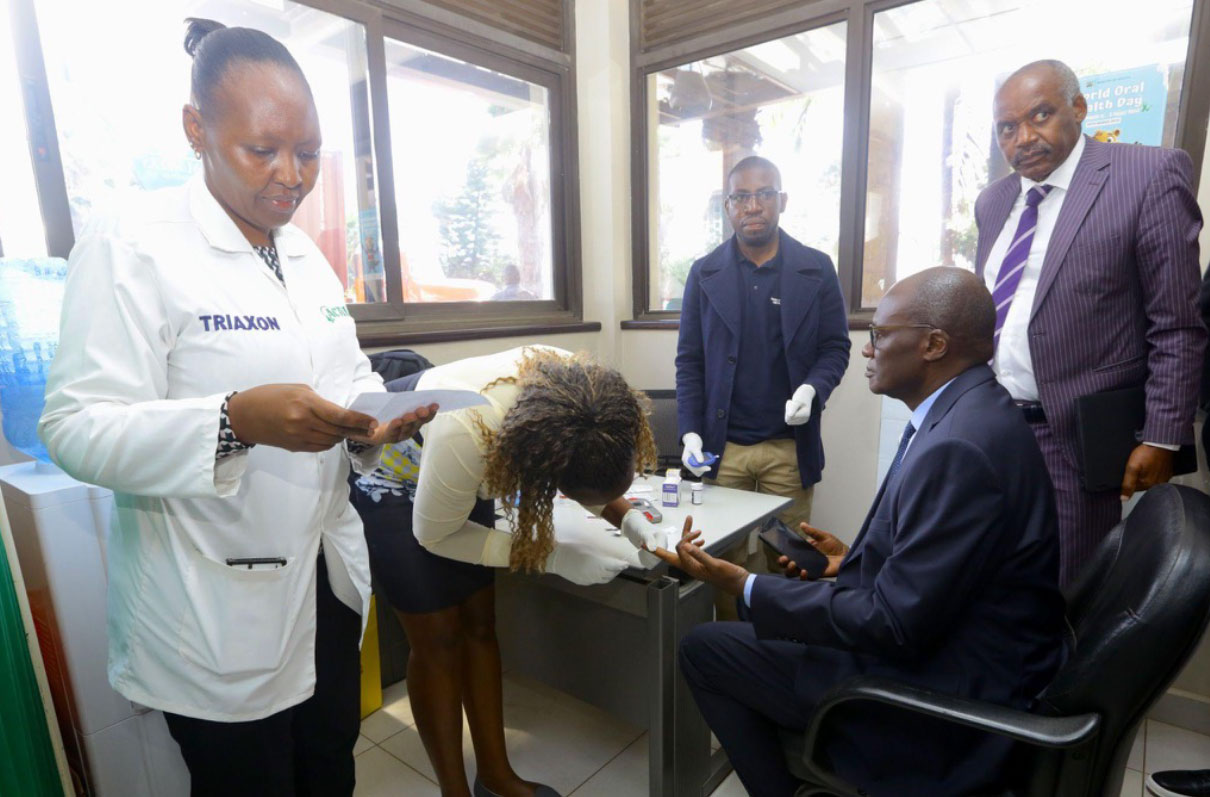 Dr. Patrick Amoth, Director General for Health (sitting) takes the lead in preventive care as he undergoes the full "Know Your Numbers" screening at the Ministry of Health grounds — a powerful gesture that reinforces leadership in action when it comes to combating non-communicable diseases.
Dr. Patrick Amoth, Director General for Health (sitting) takes the lead in preventive care as he undergoes the full "Know Your Numbers" screening at the Ministry of Health grounds — a powerful gesture that reinforces leadership in action when it comes to combating non-communicable diseases.
 Dr. Gladwell Gathecha (right) Champions awareness on the ground. As Acting Head of the Division of Non-Communicable Diseases, she models the importance of regular health checks by participating in the full screening of the five vital health numbers.
Dr. Gladwell Gathecha (right) Champions awareness on the ground. As Acting Head of the Division of Non-Communicable Diseases, she models the importance of regular health checks by participating in the full screening of the five vital health numbers.
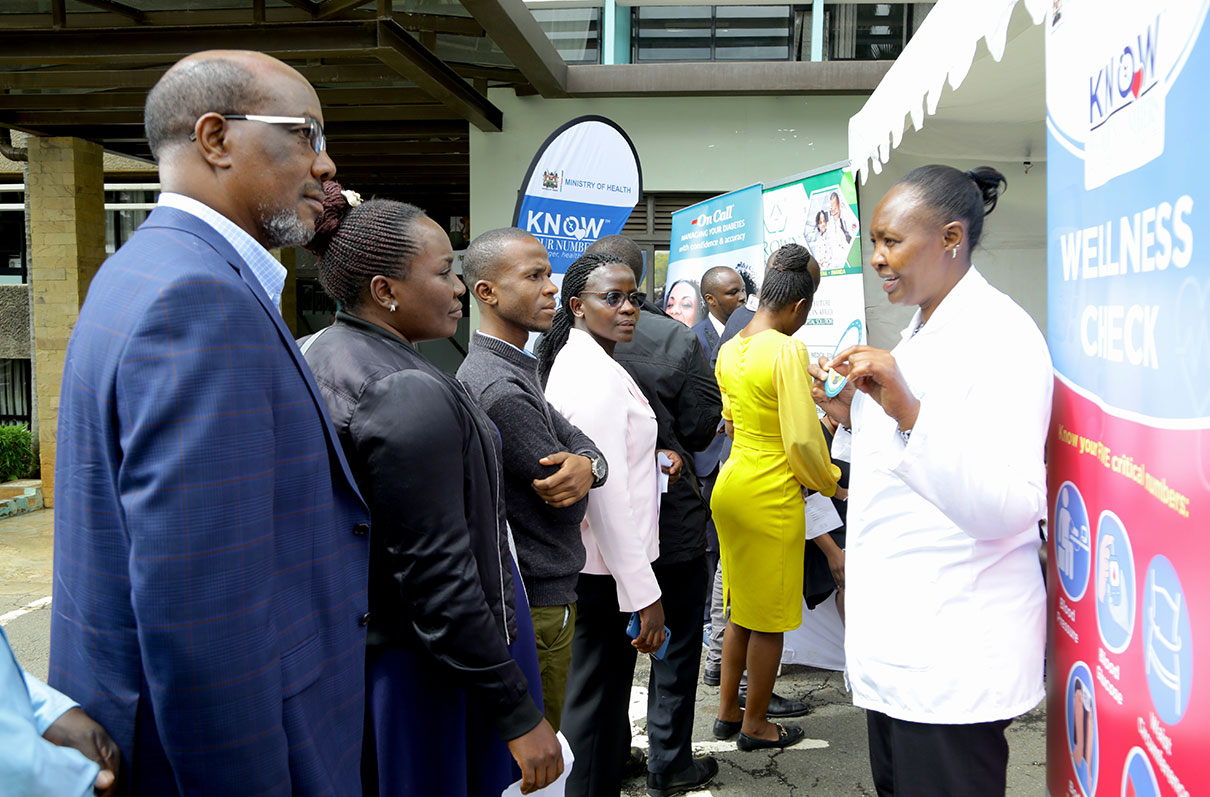 Mr. Lawrence Gikaru, Executive Director and Founder, Doctors for Healthy Living (Far Left), is welcomed at the first screening station, signaling the start of a collaborative effort to empower individuals with critical health knowledge.
Mr. Lawrence Gikaru, Executive Director and Founder, Doctors for Healthy Living (Far Left), is welcomed at the first screening station, signaling the start of a collaborative effort to empower individuals with critical health knowledge.
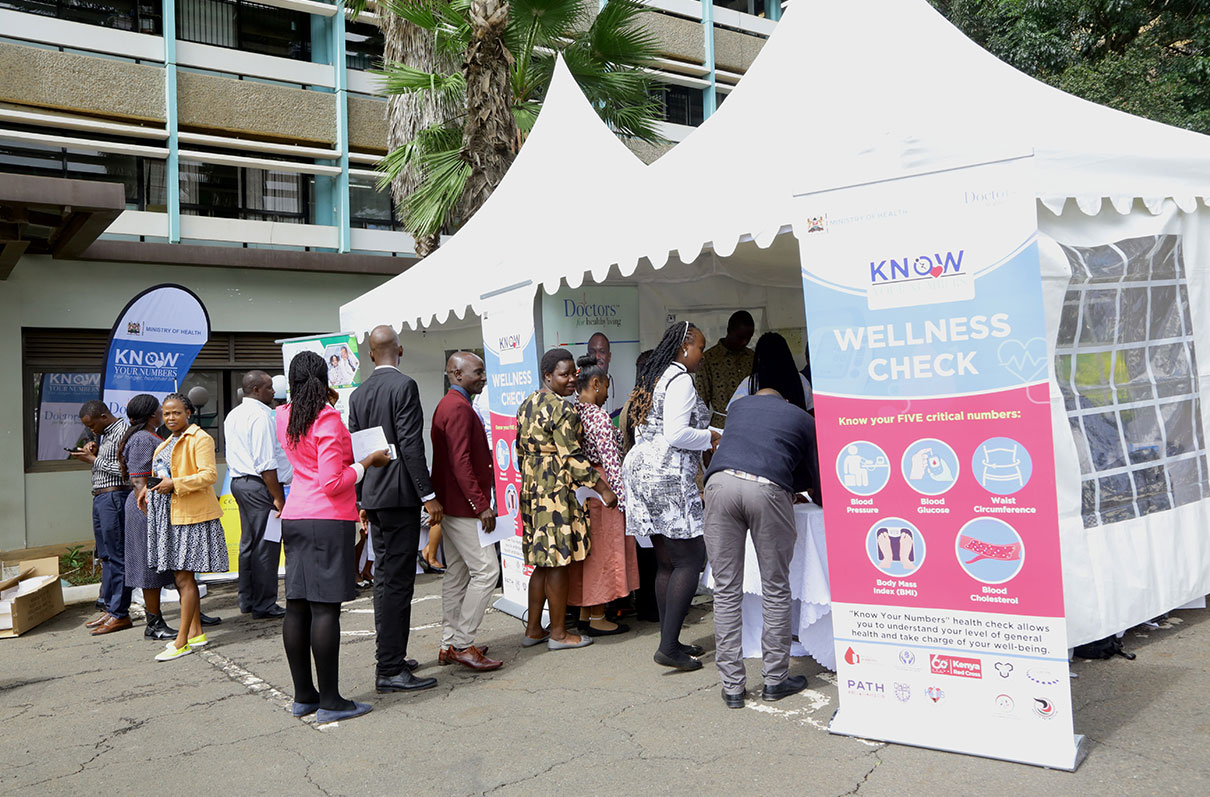 MOH staff gathered in large numbers to participate in the comprehensive wellness screening initiative.
MOH staff gathered in large numbers to participate in the comprehensive wellness screening initiative.
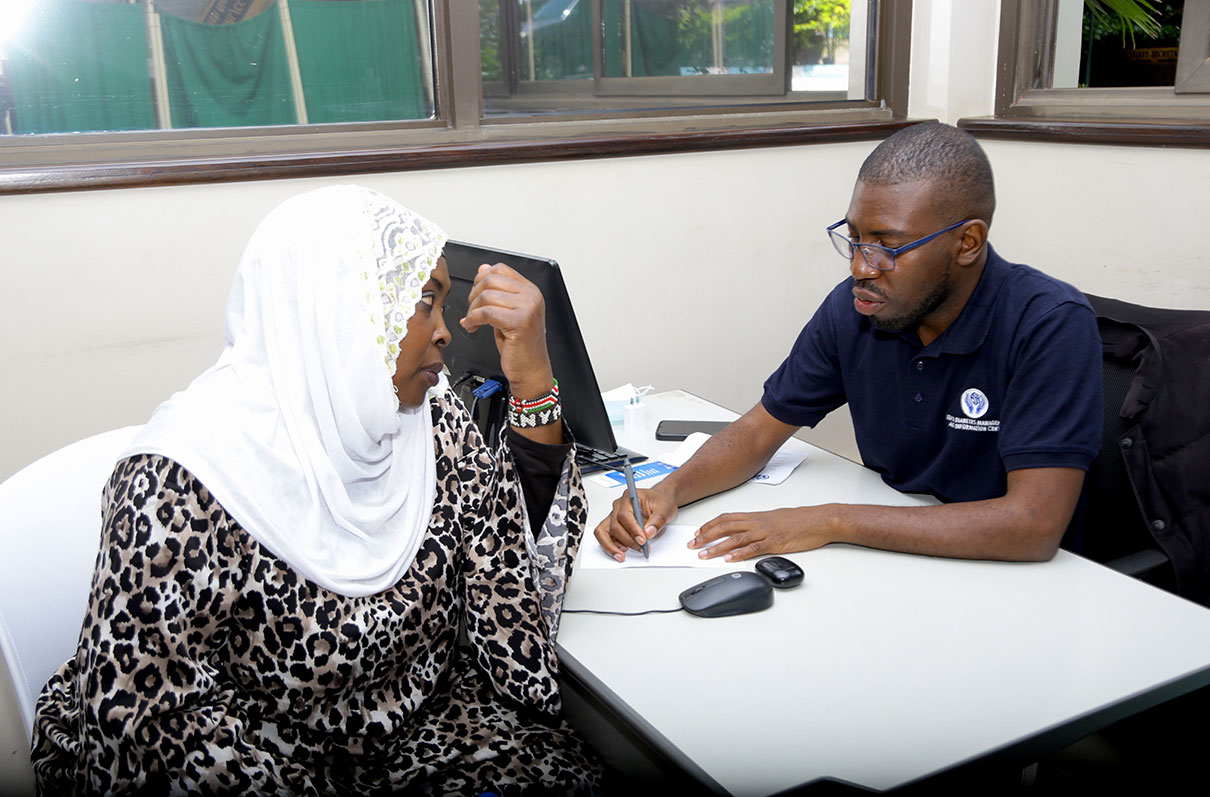 Nurse Anthony Omondi of the Kenya Diabetes Management and Information Centre offers one-on-one counselling to a participant, turning numbers into meaningful health decisions.
Nurse Anthony Omondi of the Kenya Diabetes Management and Information Centre offers one-on-one counselling to a participant, turning numbers into meaningful health decisions.
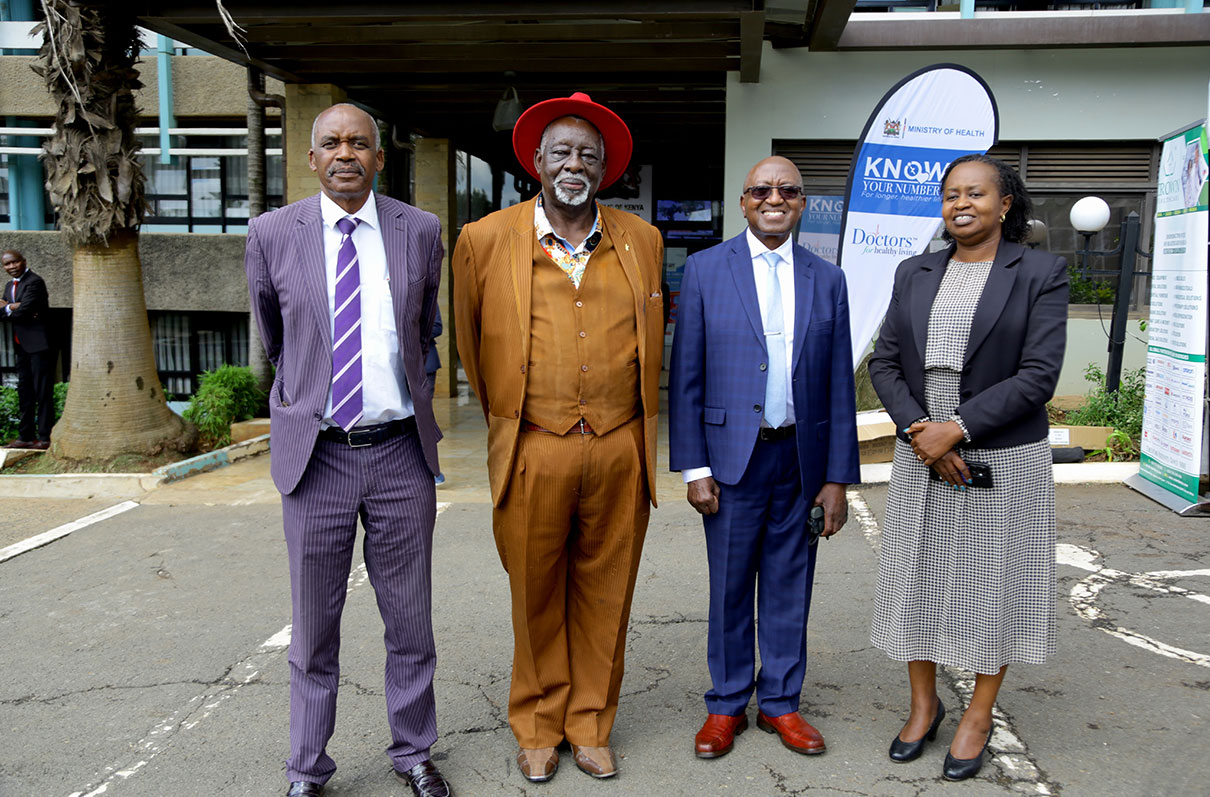 (From Left to Right) Dr. Mutuma, Clinical Consultant & Forensic Pathologist; Dr. Joseph Aluoch, Patron, D4HL; Dr. Robert Mathenge, Co-Founder, D4HL; and Dr. Gladwell Gathecha, MOH NCD Division — together, they represent a united front in the fight against non-communicable diseases.
(From Left to Right) Dr. Mutuma, Clinical Consultant & Forensic Pathologist; Dr. Joseph Aluoch, Patron, D4HL; Dr. Robert Mathenge, Co-Founder, D4HL; and Dr. Gladwell Gathecha, MOH NCD Division — together, they represent a united front in the fight against non-communicable diseases.